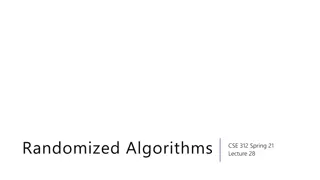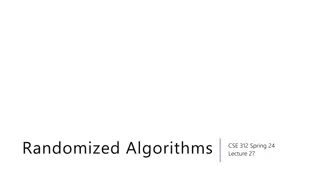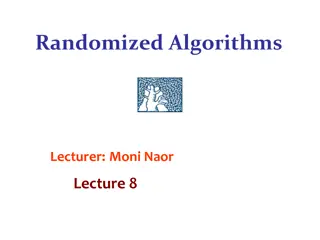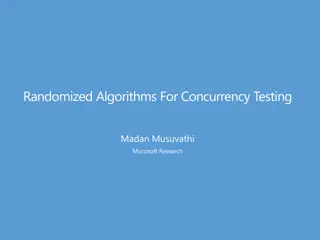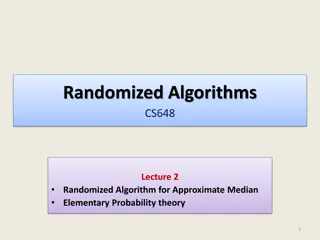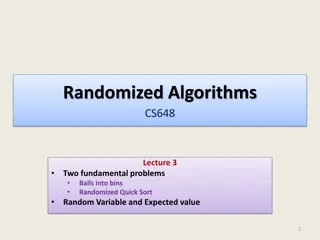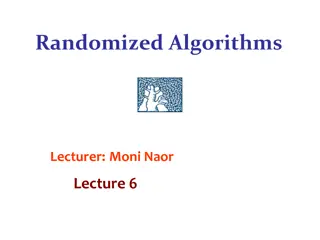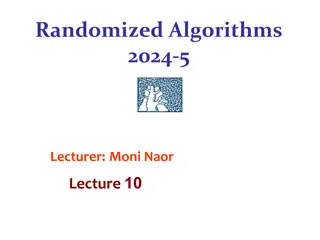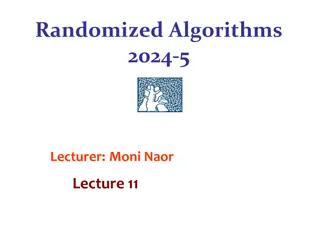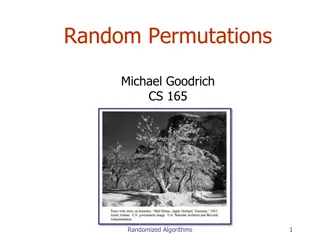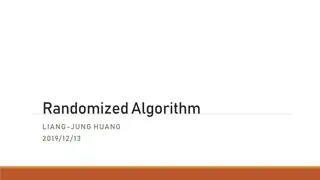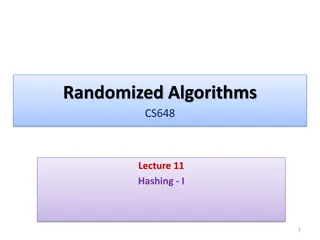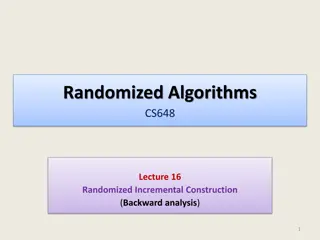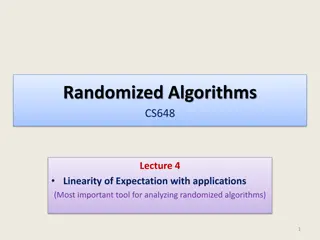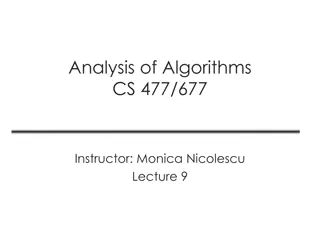Randomized Algorithms: Types and Examples
Explore the world of randomized algorithms through types like Las Vegas and Monte Carlo, with a focus on classic examples such as Quick Sort. Learn how randomness plays a crucial role in computation and discover the principles behind these algorithms. Dive into the applications of randomized algorit
0 views • 22 slides
Randomized Algorithms: A Deep Dive into Las Vegas and Monte Carlo Algorithms
Randomized algorithms incorporate randomness into computations, with Las Vegas algorithms always providing the correct answer but varying in time, while Monte Carlo algorithms occasionally give wrong answers. Quick Sort is a classic Las Vegas algorithm that involves pivoting elements for sorting. Ch
5 views • 21 slides
Overview of Mutual Exclusion and Memory Models in Distributed Systems
Discussion on fast, randomized mutual exclusion techniques by George Giakkoupis and Philipp Woelfel. Exploring asynchronous shared memory systems with atomic operations. Understanding mutual exclusion principles as outlined by Dijkstra in 1965 and measuring time efficiency in critical sections. Delv
2 views • 23 slides
Advanced Encoding Techniques in Randomized Algorithms
Explore innovative approaches in randomized algorithms through techniques such as perfect memory, efficient card guessing strategies, and polynomial encoding methods over finite fields. Learn how to optimize memory usage and enhance predictive capabilities in algorithmic processes.
3 views • 41 slides
Probabilistic Concurrency Testing for Bug Detection
Explore the concept of probabilistic concurrency testing and how randomized scheduling algorithms can help detect bugs efficiently. Learn about bug depth, randomized algorithms, and the development of PCT to improve the effectiveness of stress testing tools like Cuzz.
0 views • 23 slides
Challenges and Solutions in Concurrency Testing with Randomized Algorithms
Concurrency testing in complex cloud services presents challenges such as bugs, performance problems, and data loss. Randomized algorithms, like Probabilistic Concurrency Testing (PCT), offer effective bug-finding solutions. PCT provides probabilistic guarantees and scalable bug detection for distri
0 views • 37 slides
Randomized Algorithms for Approximate Median with Elementary Probability
This content covers a lecture on a randomized algorithm for finding an approximate median element using elementary probability theory. It discusses the importance of insight and basic probability in designing and analyzing such algorithms. The lecture presents a simple probability exercise involving
2 views • 25 slides
Randomized Algorithms
Concept of Balls into Bins in randomized algorithms, focusing on calculating probabilities of specific events and understanding the probability space. Theoretical theorems and experiments are discussed to analyze the occurrence of empty bins.
0 views • 34 slides
Trapezoidal Maps: Randomized Point Location Scheme & Data Structures
Trapezoidal maps are a key data structure in computational geometry, providing efficient point location schemes and decomposition methods. This concept is captured through randomized algorithms with optimal query and construction times. The maps are based on line segment sets that do not intersect b
0 views • 45 slides
Randomized Algorithms and Independence Concepts
Types of independence in randomized algorithms are explored alongside the concept of random bit complexity and generation. The idea of mutually independent random variables versus pairwise independent random variables is discussed, illustrating how to generate uniformly random and pairwise independe
1 views • 18 slides
Randomized Algorithms
This content delves into the intricacies of using randomized algorithms to tackle the challenge of counting perfect matchings in dense bipartite graphs. It explores the complexity of the problem, its connection to the permanent of the adjacency matrix, and the relationship between perfect matchings
1 views • 64 slides
CS 121: Lecture 24 Intro to Randomized Algorithms
Dive into a world of Randomized Algorithms with Professor Adam Hesterberg at Harvard University. Explore topics such as Polynomial Identity Testing, Approximation for Maximum Cut, and Properties of Randomized Computation in this informative lecture series. Discover different views on Randomized Algo
0 views • 28 slides
Randomized Algorithms
Exploring the Partition Theorem and Find-Min algorithm in the context of randomized incremental construction. Understand how to apply the theorem effectively and solve complex problems magically. Dive into the closest pair of points problem with deterministic and randomized algorithms. This content
1 views • 20 slides
Lecture 9 Randomized Algorithms
Dive into the world of randomized algorithms with a focus on quicksort, quickselection, recursion, rejection sampling, biased coin simulation, and Monte Carlo algorithms. Explore concepts, examples, and applications in this fascinating field.
0 views • 8 slides
Randomized Parameterized Algorithms
This content delves into the realm of randomized parameterized algorithms and their de-randomizations. Explore the intricacies of how these algorithms work and their various applications in the world of computer science.
0 views • 40 slides
Randomized Algorithms
Randomized algorithms provide efficient solutions to complex problems by leveraging randomness. From finding global minimum cuts to exploring distributed algorithms, this lecture series delves into the realm of randomized complexity classes. Through examples and discussions on differential privacy a
0 views • 21 slides
Understanding Randomized Communication Complexity in Complexity Theory
Explore the concepts of communication complexity, deterministic and randomized protocols, and error probabilities in computing functions within the realm of complexity theory. Dive into the nuances of randomized communication protocols and their effectiveness in solving problems with minimal communi
0 views • 16 slides
Randomized Numerical Linear Algebra by Petros Drineas - Sketch Algorithms for Matrix Sampling
Explore the world of randomized numerical linear algebra with Petros Drineas from Rensselaer Polytechnic Institute. Learn about sketch algorithms for matrix sampling, including row and column sampling techniques such as length-squared sampling and leverage scores. Discover how these sampling methods
0 views • 58 slides
Analyzing Randomized Algorithms and QuickSort
Explore the concepts of randomized algorithms, including QuickSort, and learn how to measure their runtime and performance. Discover the significance of Las Vegas algorithms and delve into sorting algorithms like BogoSort. Dive into understanding the analysis of randomized algorithms and their pract
0 views • 43 slides
Memory Checking Model and Efficient Guessing Strategies in Randomized Algorithms
Explore the Memory Checking Model for secure data access and efficient guessing strategies in Randomized Algorithms. Discover how encoding techniques and memory utilization enhance performance in computational tasks.
0 views • 17 slides
Local Lemma Theorem and Applications in Randomized Algorithms
Explore the Local Lemma Theorem and its applications in Randomized Algorithms, including Lovasz Local Lemma, Union Bound, and k-wise independent events. Learn about applying the Local Lemma for k-CNF formulas, the Hat Game, and more.
1 views • 40 slides
Randomized Algorithms 2024-5: Guessing Cards and Communication Complexity Bounds
Explore the concepts of guessing cards, simultaneous communication complexity bounds, and efficient encoding techniques in randomized algorithms. Dive into strategies for memory-based card guessing and optimal memory allocation for maximizing correct guesses. Discover the underlying principles of si
0 views • 48 slides
Randomized Algorithms Lecture Summary
Learn about randomized algorithms from the lecture by Moni Naor, covering topics such as Cuckoo Hashing, Bloom Filters, Random Graphs, and more. Understand the structure of proofs by compression or encoding and the complexities of inverting random functions. Explore the dynamic dictionary setting, s
1 views • 56 slides
Understanding Randomized Algorithms for Generating Random Permutations
Explore the concept of random permutations in computer science, including random sort algorithms, Fisher-Yates shuffling, and analysis of permutation probabilities. Discover how randomized algorithms play a crucial role in various applications, such as card games and efficient algorithm design.
0 views • 7 slides
Exploring Randomized Algorithms in CS648 and Examples
Discover the world of randomized algorithms in CS648, including the definition, structure, and examples like Approximate Median and Randomized QuickSort. Dive into the concepts, motivations, and running times of both deterministic and randomized algorithms, gaining insights into the fascinating real
0 views • 24 slides
Understanding Randomized Algorithms in Neural Networks
Explore the concept of randomized algorithms in neural networks, their significance, practical applications, and famous examples like Polynomial Identity Testing. Learn how randomness is utilized to enhance efficiency, accuracy, and complexity in algorithm design.
0 views • 25 slides
Hashing in Randomized Algorithms - Overview and Applications
Explore the concept of hashing in randomized algorithms, understand its problem definition, solutions, collision handling, and why hashing works effectively in practice. Learn about the efficiency, guarantees, and complexities associated with hashing in maintaining data structures.
0 views • 24 slides
Causal Studies and Randomized Experiments Overview
Explore the design and analysis of causal studies with randomized experiments led by Dr. Kari Lock Morgan and Dr. Fan Li at Duke University. Dive into covariates, assignment mechanisms, and creating balanced treatment groups for estimating causal effects. Understand classical randomized experiments
0 views • 24 slides
Applications and Insights into Randomized Algorithms
Discover the application of fingerprinting techniques and 1-dimensional pattern matching in randomized algorithms. Learn about designing randomized algorithms based on random ideas, insight into problems, and the role of randomization in materializing ideas. Explore topics such as Randomized Quick S
0 views • 35 slides
Randomized Incremental Construction in Algorithms CS648
Dive into the concepts of randomized incremental construction in CS648 algorithms through backward analysis and forward analysis. Explore the Find-Min problem, algorithms, probabilities, and more in this detailed lecture content.
0 views • 47 slides
Analyzing Randomized Algorithms: Linearity of Expectation and Applications
Explore the concept of linearity of expectation in randomized algorithms, a crucial tool for analysis. Learn about random variables, expected values, and solve problems using this fundamental concept.
0 views • 27 slides
Randomized Algorithms Methods and Limitations
Exploring Chebyshev and Chernoff inequalities, this content delves into the applications, limitations, and examples of randomized algorithms. It discusses scenarios where Chernoff bound is inapplicable and touches upon concepts such as balls into bins and number of triangles in a random graph.
0 views • 32 slides
Analysis of Algorithms CS 477/677 Lectures on Random Variables, Expectation, Indicator Random Variables, and Quick Sort
Learn about random variables, expectation, indicator random variables, and the analysis of randomized Quicksort algorithm in these CS 477/677 lectures by Instructor Monica Nicolescu. Understand concepts such as discrete random variables, expected value calculations, and the workings of randomized Qu
0 views • 37 slides
Randomized Algorithms in Matrix Multiplication: Freivalds Algorithm and Beyond
Delve into the world of randomized algorithms with a focus on Freivalds Algorithm related to matrix multiplication. Explore how this approach offers a faster solution compared to deterministic methods. Discover the history, applications, and implications of these algorithms in the realm of matrix op
0 views • 9 slides
Randomized Algorithms - Lecture Insights
Uncover the intricacies of randomized algorithms in this lecture series, covering topics ranging from 2-SAT and 3-SAT to Probabilistic Turing Machines and language recognition. Delve into complexity classes like BPP, ZPP, and RP, exploring decision problems and strong vs. weak BPP scenarios. Engage
0 views • 14 slides
Understanding Randomized Algorithms and Their Applications
Randomized algorithms leverage randomness to enhance performance, providing pseudo-randomness for various applications. Learn about their concepts, examples, and significance in diverse problem-solving scenarios like gender identification in a large population and polynomial equality verification.
0 views • 40 slides
Advanced Algorithms: Randomized Algorithms and Computation Techniques
Explore randomized algorithms for computing in advanced algorithms class. Learn about approximating, verifying, and calculating using randomized methods. Dive into estimating the area of a unit disk with precision. Discover applications of Chernoff bound for analysis and error estimation.
0 views • 27 slides
Applications of Backward Analysis in Minimum Spanning Tree Algorithms
Exploring various algorithms for Minimum Spanning Trees, including Prim's, Kruskal's, and Boruvka's algorithms. Discussing the use of deterministic and randomized algorithms, MST verification, and the Karger-Klein-Tarjan algorithm. Highlighting the concept of light edges in relation to MSTs and the
0 views • 50 slides
Randomized Subexponential Algorithms in Games on Graphs
Explore the concept of randomized subexponential algorithms in the context of games on graphs, touching on strategy iteration, values, sum of values, and strategy improvement algorithms. The discussion includes Switch-All algorithm, Randomized algorithms for LP-type problems, and Recursive Random Ac
0 views • 22 slides
Probabilistic Methods in Randomized Algorithms: Exploring Min-Cuts and Acute Triangles
Explore the use of probabilistic methods in randomized algorithms by studying concepts like min-cuts and acute triangles. Understand how these methods leverage probability theory to achieve deterministic combinatorial results, and delve into the analysis and probabilities associated with these algor
0 views • 26 slides
